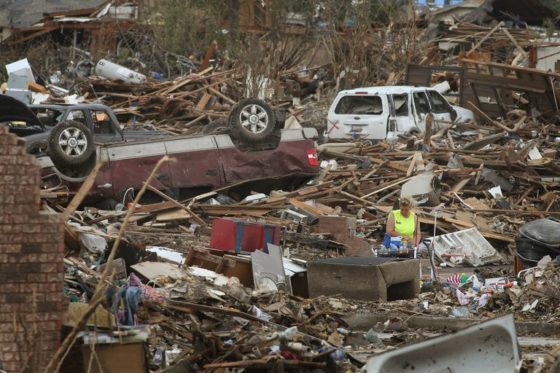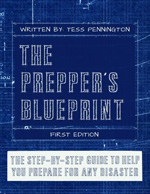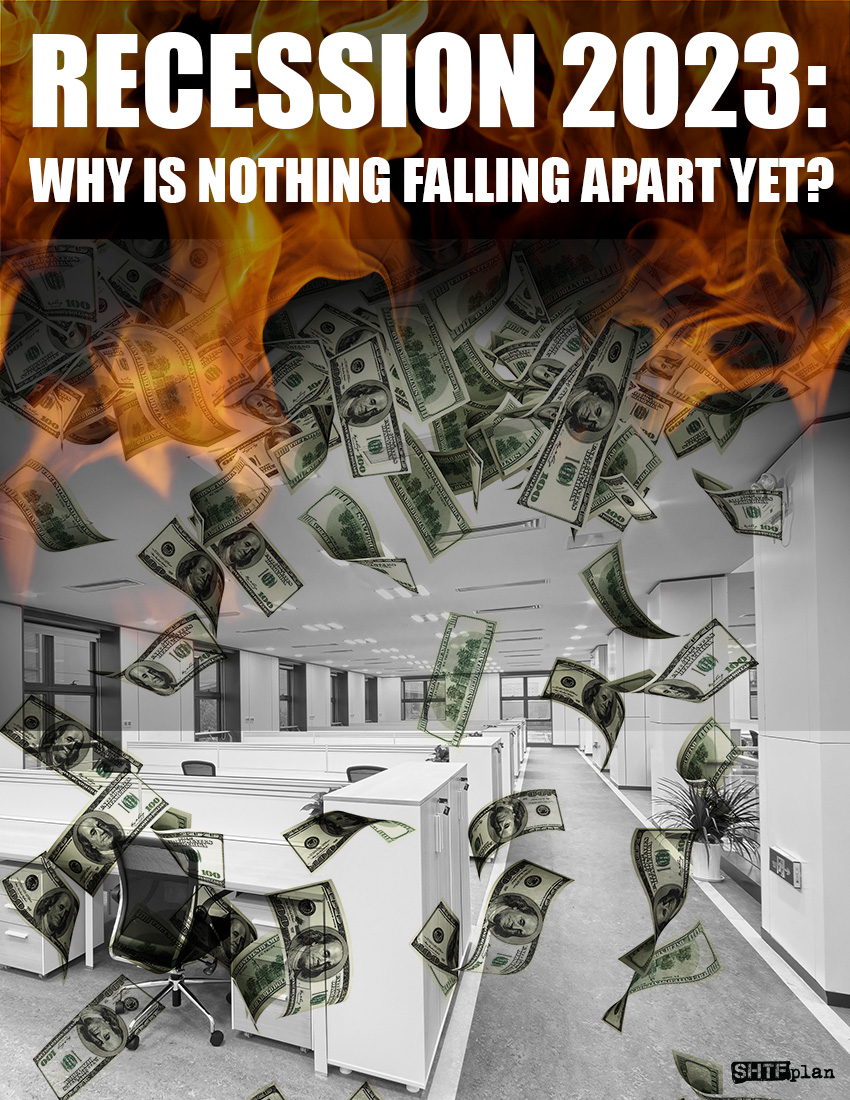
Even though government agencies (and websites such as this one) have warned in the past that Americans should prepare for disasters, the FEMA (Federal Emergency Management Agency) says Americans are still lacking a “culture of preparedness.” Brock Long says that even after the destruction of the 2017 hurricane season, many still are not prepared for this year’s storm season -which has already begun.
As a culture, Americans tend to live above their means, have a lot of debt, and assume the government will always be there to bail them out. They simply lack the drive to prepare themselves for a disaster and many don’t even know when or where to start. According to WKYC3, Long said being ready for a disaster requires more than storing food, water, and supplies. It also means having some money saved for an emergency is just as vital. That one preventive measure, saving a few thousand dollars in an emergency fund, can have a major impact and possibly mean the difference between life and death.
Financial saving has been difficult for most Americans, as they continue to pile on more debt to buy more things that are far from necessary. But with the hurricane approaching and damage already being done during the 2018 hurricane season, Americans should consider preparing themselves.
A simple, yet inexpensive way to prepare, is to put together an emergency kit. This is the first recommendation of the Red Cross, which lists some of the top essentials as water (a gallon per person per day for a minimum of three days), non-perishable food (also at least three days’ worth), medications and medical supplies, flashlights, extra batteries, a first-aid kit and a portable radio. One should as consider having personal documents, cell phones with chargers, a can opener and at least one change of clothes ready to toss in the emergency kit. These necessities can also easily all be assembled well before a hurricane hits.
You should also make sure your car is in working order and with a full tank of gas, the cell phones remain charged and the drug prescriptions have been filled just in case evacuation becomes necessary. Keep important documents in a safe, accessible place, with copies of files loaded into a flash drive or into password-protected storage. Consider taking cellphone photos of key documents so you won’t have to worry if they get destroyed.
 Long says most citizens are ill-informed about preparedness in general. More recently, Long has discussed the need to engage in conversations at home and at work so that individuals and the businesses they operate have plans for continuity of operations during a disaster. These statements hint at our need for a new approach to our national disaster framework, one with more self-reliance.
Long says most citizens are ill-informed about preparedness in general. More recently, Long has discussed the need to engage in conversations at home and at work so that individuals and the businesses they operate have plans for continuity of operations during a disaster. These statements hint at our need for a new approach to our national disaster framework, one with more self-reliance.
An easy step anyone can begin to implement today is to become more aware of where their money is spent, so savings for any disaster, which may seem minimal at first, can begin. Without extra money, all other preparedness becomes difficult. Just take the first step, and the rest will slowly become easier.
If you struggle knowing where or when to begin prepping for disasters, consider reading a book titled The Prepper’s Blueprint. It offers detailed guides and easy to follow instructions for even the most beginner of preppers. The step-by-step disaster guide offers expert advice on how to deal with a variety of different disaster scenarios, which will help Americans develop a “culture of preparedness” that is so desperately needed.










My first thought on reading this article’s title was, “speak for yourself”. But unfortunately, it is true. Even amongst the prepper community (at least by my local perspective) there’s been a large drop-off in effort, cohesiveness, continued skill acquisitions and so on. Even a local gunshow this last weekend, I hate to say it; but, the numbers were down.
Heartless, the article is spot on. But there’s been no drop-off in effort on my part. Went shopping again over the weekend. I’m still cohesive and acquiring skills. No one will see me losing interest in prepping; bank on it.
True many have not. But many are just about tapped out on funds to buy with. Sad situation.
Many of them may be stocked up,ready for something to happen. How much ammo must one keep buying to be enough? They my have enough for a lifetime. Others will wait for the government to bail them out. they will be out of luck.
Most people are unfit for constructive labor, even to the point of subsistence, during peacetime. In and of itself, that is the disaster. The rebuilding doesn’t have to be punctuated by Earth changes or space debris.
Beaumont, you said a mouthful when you said “most people are unfit for constructive labor.” Not only physically but also mentally. No one wants to do for themselves anymore. They want to become freeloaders and live off working people’s tax money nowadays. Only problem is that the number of people in the workforce goes down every year while the number of people getting on the programs goes up at the same time. That’s not permanently sustainable.
but, But, BUT, BUTT
Why should I prepare????
FEMA will be there for me…….
Right?
We all know ya “Cant Fix Stupid”, you can only try to help those that are interested.
Our ancestors didn’t call it preparedness. They called it “common sense”. Every home in 1970 had a pantry in my region. Nobody but some hopeless goofball or some rich apartment snobs avoided having one.
It was not at all unusual for basements to have a cool dry room with shelves and very rudimentary cabinets for food storage. Old time homes had laundry hatches to the basement where it fell next to the washer and dryer. And there was always a big sink and a wringer. How often do you see this now? Right next to it was a washing scrubbing board and my grandmother would sometimes use that EVEN WHEN she had a washing machine.
The very poor had cupboards for this purpose. You have to remember that people seldom had a large freezer section or whole freezers. The freezer section was effectively 1/4-1/3 of present standards as only wealthy people ate frozen food in large amounts as it came at a premium price. Heck, very few had an ice machine. People filled ice trays.
But if someone was a hunter or owned livestock, they had freezers. Some upper middle class folks had chest freezers. The big push began around 1974 where people would buy butchered bulk meat and lots of hamburger that once was CHEAP and of higher quality. I dare say some ground beef was closer to ground chuck back then. Whole fryers were cheap. I was shocked the first time relatives bought cut up chicken as that seemed extravagent…when you could easily do it yourself. That was mostly to make wings. I reckon a lot of people don’t know how to do this based on their expressions when working in a kitchen so I often volunteered to do it. If you asked a Millennial to cut a “keel” when butchering a chicken, I bet one a 5,000 would know what you were talking about. Old restaurants often cut keels when frying chicken, and folks liked that piece as it’s flavorful.
So having common sense, people around these parts would garden and canned their own havest.
The positive change happened after 1990 when some began home dehydrating. This greatly increased how much food you could store in a small space. It didn’t get popular until after 2000. Then you began to see routine articles on solar air drying produce as they did in history especially with herbs.
Dried beans and legumes was always the least expensive way to cook, though some suburban young people sneered at it in 1985 as they were not used to it. But military families and rural folks had routinely cooked that way to be frugal.
Canned soup and cake mixes were weird and uncommon when they first came out.
People rarely ate fresh fruit out of season as it was so expensive. Produce sections were smaller and not so fancy but expensive grocery chains had them. I felt totally guilty buying fresh produce in 1985 but it was a treat for family to buy unusual things like white flesh peaches, golden pineapple, figs,etc.
I remember my mother used grind up certain kinds of meat and make lunch meat spreads. All us kids helped at canning and jelly making time. Yep, everyone had a pantry and/or root cellar except the rich people who could afford “fancy food” or meat lockers that held frozen sides of beef, etc.
My grandparents on both sides had home canned goods in their basement. One set of grandparents had a root cellar. We kids would beg for a carrot or apple but grandpa occasionally surprised us with a kohlrabi. He’d laugh at our reaction but we’d eat them raw and liked it. We kids also had to “work” for our treat by helping with weeding or gathering dandelions for grandpa’s wine making.
Lots of people work construction, but in the old days, a young guy was fortunate to work around craftsmen. Those guys were sharp and could cleverly make beautiful items. They used great care and were artistic as well as utilitarian. Often a craftsman woodworker made fine furniture, had woodcarving tools, could make just about anything using inlay and burl. Around here they were Germans.
Even the electricians, sheetmetal, mechanical repair folks who were craftsmen could do multiple trades and design something from scratch. Old machinists were that way, and to some degree due to computer designed milling machines, can make just about anything. Old time electronics craftsmen could do just about everything and program in PLCs and programmable limit switches, designing as much as engineers due in programming automation. Some welders, could do underwater welding and were craftsmen. Almost all these guys were of German ancestry around here.
Girls were taught how to cook, clean and maintain an orderly home, garden then can, and sew along with other feminine arts such as embroidery or knitting. It was all about how to run a good and efficient household that included managing a budget. There is a lot that goes into all of these things.
As the eldest of all girls, I also got to help my father do things so I learned how to build a boat, paint, and other messy things like find worms for fishing or small woodworking projects. I had a fun childhood.
I guess that there will be some of us that have prepped that will still be standing fighting off the zombies. Then again maybe we will end up living high on the hog???????
Just ordered some powdered Peanut butter and Honey. Canning and dehydrating the crap out of the garden.
All we can do is the best we can.
Sgt.
How to properly cut up a chicken, with lots of tips, and pointing out the oyster. There is an old Chinese tale about a master butcher who had the exact same cleaver to cut everything after 15 years, cutting an enormous amount of meat because he never harmed the edge as he could see in his mind precisely where the joint was, and accurately hit the spot each time, preserving the blade.
https://www.youtube.com/watch?v=YHIucx1HTO8
When you know how it do it right, you can save a lot of money and use each part properly. Otherwise you will end up raising spoiled kids who only like boneless chicken breast.
In the early nineties, there were special very exclusive restaurants where the chef would cook for the party and describe every aspect, and it was extremely expensive to get the show and the instruction.
Here is the keel.
https://www.youtube.com/watch?v=4zD6r-a2-Z0
Great fried chicken MUST have the bone in as it adds significant flavor. It you are using boneless chicken breast, you are paying a premium price, but are getting cheated on flavor.
Oh, too true about boneless meat. I was at Trader Joe’s today picking some pre-storm essentials (chocolate, for one) and aside from drum sticks or whole chickens, everything else was boneless. I snagged the last whole bird. My crock pot will be busy tomorrow. Yum!!
In 1974, better quality ground beef was the norm and it might have regularly cost $0.98 but often was on sale for much less. You might have got it for $0.69/lb.
Now the average cost of lesser quality ground beef averages $4.21! Who in the world wants it at that price??? Unless you’re making burgers, then it’s way too expensive.
Heck, you can eat excellent pork loin at $1.99 or even $1.79/lb. That when grilled or roasted is delicious.
If you buy pork BBQ, it is horribly expensive. If you make BBQ is is not. Those giant country style ribs are a bit wasteful due to the bone but cheap versus buying them ready made.
A chicken sized lobster bought from a fisherman is cheap in Maine. They are easy to cook. To buy it prepared is horribly expensive.
If prices are higher but people are effectively getting paid less with less benefits, then yes…a lot of folks struggle to be preppers.
But if they can learn, then can end up saving and then incrementally can make enough to make small investments or better, pay down against the principal on their home mortgage.
Buying tools is expensive and an investment. This means buying used things at garage sales and when people move.
Every appliance when I was newly married were all very used and I learned how to repair them. It’s not difficult. I felt guilty later buying new things as it wastes YHWH’s money.
Three days of supplies to get you through a disaster. Some of the more enlightened of the “experts” say two weeks. The same people who are giving this ridiculous advice will have total power under martial law thanks to several executive orders. This would be funny if it weren’t so tragic when SHTF comes.
Yea, But we don’t want the Tares to prep, The whole object of the tribulation is to separate and burn them .we are separating pretty good . Lines are being drawn. And don’t go helping a Tare, That extra flask of oil is to burn them , Even the foolish virgins get absolutely no help or mercy. The door is shut , and we do not even know them.
Is that the point of the parable of the Tares and Wheat?
Hmmm. Isn’t the point to help spread the Gospel so they participate in the Kingdom of Heaven? The majority of folks that Christians help do not accept that Jesus is the Messiah,but some do. And it’s good for our souls to help all of them.
No one is good but YHWH alone.Don’t think you’re less of a sinner than another. Only grace through faith in Jesus Christ saves you.
I reckon I helped lots of “tares” over decades.
The grim truth is that there is not enough food in the US for everyone to prep. There is only enough for 6% of people to prep for a year. the rest will die plain an simple